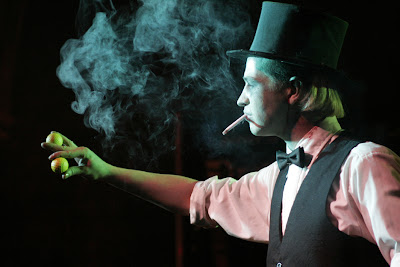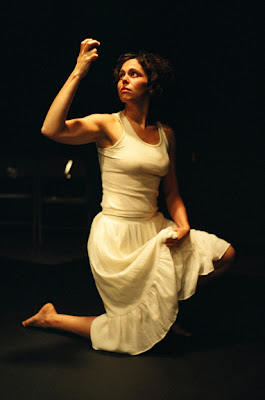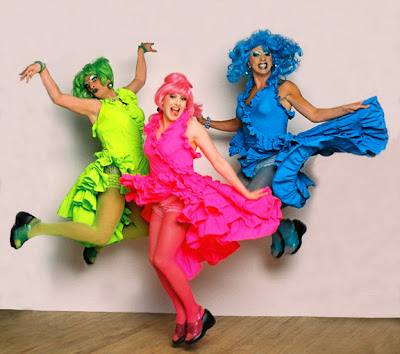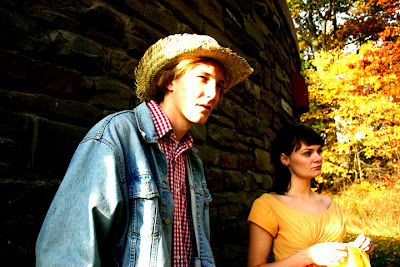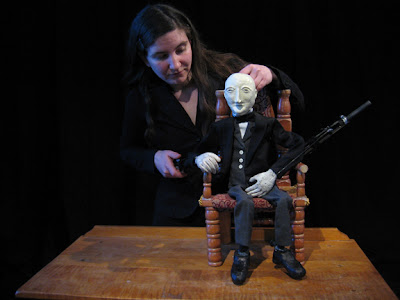1) What the fuck is going on?
That’s the crucial question – the question that as artists we have to ask ourselves every day. Marvin Gaye taught us to ask that question.
So in short: the glaciers are melting, the water is rising. The world is changing and staying the same all in the same moment. But right now, it’s very nice to enjoy a cup of tea and some coffee cake contemplating these 10 questions.
2) Is it important for a theatre company to have some kind of manifesto or mission statement?
I think it’s helpful. It doesn’t necessarily have to be too specific (it should give you license to do just about anything you want), but it’s nice to have some sort of root or anchor to return to when you’re feeling lost or without identity. When we were creating Gorey Story we’d often go back to “space and the body” to remind ourselves of the theatre we were trying to create.
I’m also a member of Wordsmyth Theatre, and their mandate is of the “great stories well told” variety. We’re rehearsing The Seagull right now and that phrase gives us a clear focus, it brings us back to what we want to do, which is to tell the story and tell it well. But if a mandate or mission statement makes you feel claustrophobic then it’s counter-productive. Change it.
Training and doing 1,000 shows. A wise busker said to me once, “until you do 1,000 shows you suck. After that, you’re just crappy.” Practice again and again and again and again and again. Keep the flow. Don’t give people a chance to interrupt or take control by having what you’re going to say planned, even if it looks made up, it can’t be. Sure you can put stuff in on the fly, but always have a bit to launch into.
4) How do you know if your jokes are funny?
Some settings lend themselves more to humour than others: in Golden Door the porn shop is a funnier place than the Japanese internment camp. Jokes in theatre have to be simple. But it’s not all that difficult for a writer because good actors can make almost any line funny with their delivery and body language. As a person who is simply not funny, I really envy that. Last June I wrote a speech for my sister and it was hilarious when she gave it. If I’d read that same text it would have been as funny as a Lake Ontario marine weather forecast.
5) What does the title of One Reed Theatre’s latest play Nor The Cavaliers Who Come With Us mean?
Nor the Cavaliers Who Come With Us is a phrase from El Requiremento – The Requirement, which was a decree created by the King of Spain, read aloud by the conquistadors to each nation or village they encountered before beginning the attack. Of course, it was read in Spanish or Latin to peoples who neither spoke nor understood Spanish or Latin, and therefore was rather useless as a tool of diplomacy or otherwise. El Requiremento basically says that the land belongs to the King and Queen of Spain, and they are sent as representatives of the church to take rightful possession of land, and that any damages or losses incurred as a result of the resistance of the people “is not our fault, nor the cavaliers who come with us.”
6) Does drag performance always refer back to ideas of gender performance?
BARBIE-Q: I think very few of our shows have anything to do with farmyard animals . . . although back when I was young I learned an interesting sound from George, our pet gander.
KORA: Idiot – that’s gender.
BARBIE-Q: Oh. I dunno.
7) What makes site-specific theatre distinct from other kinds of theatre?
It’s like that warm day in May when your high school teacher brought the whole class outside and you spent the hour learning about Social Studies while sitting on the grass. Site-specific theatre causes me to look at the same things in a different way. It removes my preconceived notions about how things should be.
8) How has your background in Russian theatre shaped your current work as a Toronto-based theatre artist?
The Russians take their theatre pretty friggin’ seriously, so some of it has washed off on me I guess. When I was studying at the Moscow Art Theatre I had a separate form in my wallet to go with my visa. It was a letter from Head Dramaturge Anatoly Smeliansky. It asserted that I truly was a student at the school and had a stamp and everything. Its main purpose was to stop cops from shaking us down, which happened on a weekly basis in the tunnels they use instead of crosswalks. It worked without fail. There was not a corrupt militsia in the city who did not know Anatoly by name. We usually got our paperz back with an apology. A world where dramaturges have that much power gives me hope.
9) Do you think that live theatre is particularly suited to telling certain kinds of stories?
Yes. But I think more than not theatre these days tries to be a film and tells stories the wrong way. Beckett and Pinter are big influences on me as an artist period. But they both made and make works that come alive on stage time and time again – Chekhov and Ibsen as well. They are first playwrights and only second, directors. They work with emotions through performance – image, plays a supporting role. Much to my disappointment, most filmmakers these days do the same thing. Film is first and foremost image.
10) Are there any recent technological innovations that are changing the way theatre is made?
Sure, especially theatre on a shoe-string. The proliferation of random crap that is cheaply available as a result of our fucked up economy sure makes it easy to make neat props. Also, flashlights just keep getting better.


